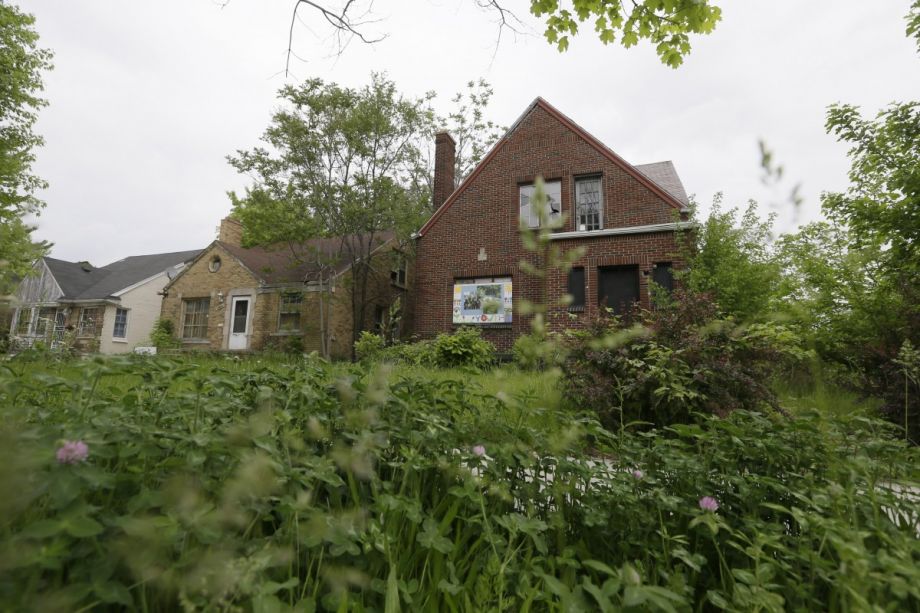The housing market doesn’t work like it’s supposed to in Detroit. It’s not just that there are far more houses in the city than there are residents. There’s also the mortgage industry that’s plainly set up in a way that makes it exceptionally difficult for those who want to put down roots in Detroit to purchase a home, no matter what income or credit score they have. (I covered this threat to the city’s health in depth for Next City late last year.)
This week, Clinton Foundation President Donna Shalala announced an unprecedented new multisector partnership, led through the Clinton Global Initiative, that aims to tackle the problem.
The new Detroit Home Mortgage initiative is intended to fill the gaps in the city’s housing industry, which is perhaps most challenged by appraisals that notoriously undervalue Detroit homes and often torpedo purchases. Unlike the city’s existing patchwork of efforts to boost homebuying in specific neighborhoods, and the residential incentives offered to people who rent or buy in Downtown and Midtown, the Detroit Home Mortgage initiative gives people the freedom to choose any house they wish, in any neighborhood they want.
A quick scan of the numbers reveals the artificial deflation of homebuying in the city. There were 3,500 sales of single-family homes in Detroit in 2014. For only 462 of them did buyers receive a mortgage. Cash sales rule the day — and that 3,500 doesn’t include homes sold in foreclosure auction. In 2013, only 529 Detroit properties were purchased with a mortgage, and of those, more than one-third were made in just four central ZIP codes (generally speaking, Downtown, Midtown, Corktown and Lafayette Park). Detroit has 46 ZIP codes. Despite the fashionibility of reviving old Detroit homes on television shows like HGTV’s “Rehab Addict,” more than 80 percent of applications for home improvement loans in Detroit have reportedly been rejected.
The system favors individuals with enormous liquid cash, including a large class of speculators and absentee landlords. It also depresses property values citywide, which are still 50 percent below what they were before the subprime mortgage crash.
I’ve long believed that the only thing that will end the cycle of dysfunction is for “interrupters” to emerge: individuals and institutions that put a stake in Detroit real estate, even though they are almost certain to lose money. For every rational reason, that is a lot to ask. But despite the odds, it’s been happening. The Talmer Bank program auctions rehabbed homes in Marygrove in hopes of upping the community’s appraisal values. Families are investing in rehabs of houses they love, at a cost they cannot expect to recoup.
But the Detroit Home Mortgage initiative is the biggest interruption yet. It is powered by a formidable team, including Detroit Mayor Mike Duggan, Michigan Governor Rick Snyder, five local banks, two national foundations, several businesses and nonprofits, and President Barack Obama’s Detroit Federal Working Group. Reportedly, Duggan raised the toxic appraisal gap with the Clinton Global Initiative in January 2015, and leaders spent the past year building the collaboration, primarily at a CGI gathering in Denver last June.
The partnership has put together a $75 million package to support Detroit home mortgages. The Community Reinvestment Fund and CGI partners involved also offer an additional $40 million in second mortgages to fund essential rehab efforts for 1,000 Detroit homebuyers over the next three years. The deal is sweetened by $6 million from the Michigan State Housing Development Authority for affordability enhancements, and $6 million from the Kresge Foundation for guarantees and credit support. A further $475,000 from Kresge, along with $400,000 from the Ford Foundation, will pay for the project’s startup. (The Ford Foundation is a supporter of Next City.)
Qualifying borrowers will be able to receive a mortgage for the house’s appraised value, and a second mortgage of up to $75,000 to fill the cost gap between the notoriously undervalued appraisals in Detroit and the repairs that are essential to make the house livable. Previously purchased homes can also be refinanced through the program.
Mortgages offered through the program by the five participating regional banks — Huntington Bank, Flagstar Bank, Talmer Bank and Trust, FirstMerit Bank and Liberty Bank — will have the same terms, the same interest rates and no bank fees. To qualify, applicants must have a minimum credit score of 640 (or 600 in some cases that haven’t yet been detailed), a down payment of as little as 3.5 percent of the appraised value, and be able to show that they make an adequate income.
Borrowers must also complete a class in homeownership and “the financial risks involved in borrowing more than the appraised value of a home” that is taught by one of a number of local counseling agencies.
This program builds on Duggan’s earlier effort to tackle another significant systemic market failure that impacts Detroiters: the radically high car insurance rates. The administration has attempted to put forward a lower-cost alternative to rates offered by other companies through a local program called D Insurance, which would allow residents to opt out of the state’s mandatory unlimited (and pricey) medical benefits and save up to $3,000 a year on their premiums. But the program has stalled in the legislature, in part because of powerful resistance by the health care industry, a deadlock that Duggan has called “completely immoral.”
But the Detroit Home Mortgage initiative, formed by a public-private collaboration that includes every level of government, appears to have a more promising future. In some ways, it’s a partnership that is reminiscent of the complicated convening behind the “grand bargain” that brought Detroit out of the largest municipal bankruptcy in U.S. history just over a year ago. Depending on how this unfolds in practice, it could be a model for intervention in shrinking urban centers around the country.

Anna Clark is a journalist in Detroit. Her writing has appeared in Elle Magazine, the New York Times, Politico, the Columbia Journalism Review, Next City and other publications. Anna edited A Detroit Anthology, a Michigan Notable Book. She has been a Fulbright fellow in Nairobi, Kenya and a Knight-Wallace journalism fellow at the University of Michigan. She is also the author of THE POISONED CITY: Flint’s Water and the American Urban Tragedy, published by Metropolitan Books in 2018.
Follow Anna .(JavaScript must be enabled to view this email address)
















